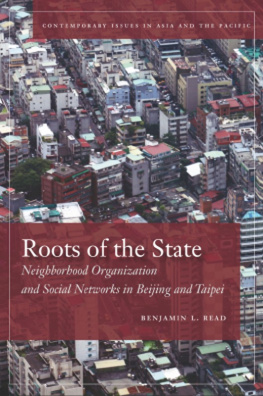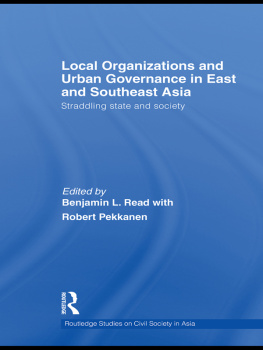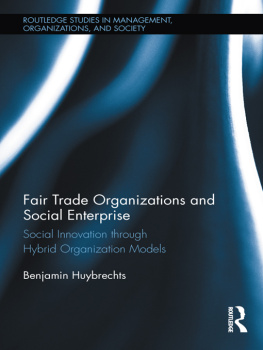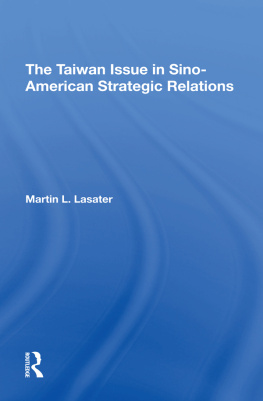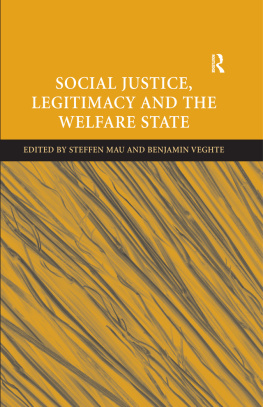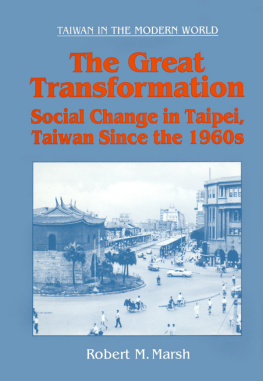Stanford University Press
Stanford, California
2012 by the Board of Trustees of the Leland Stanford Junior University.
All rights reserved.
No part of this book may be reproduced or transmitted in any form or by any means, electronic or mechanical, including photocopying and recording, or in any information storage or retrieval system without the prior written permission of Stanford University Press.
Printed in the United States of America on acid-free, archival-quality paper
Library of Congress Cataloging-in-Publication Data
Read, Benjamin Lelan, author.
Roots of the state : neighborhood organization and social networks in
Beijing and Taipei / Benjamin L. Read.
pages cm. (Contemporary issues in Asia and the Pacific)
Includes bibliographical references and index.
ISBN 978-0-8047-7564-9 (cloth : alk. paper)
ISBN 978-0-8047-7565-6 (pbk. : alk. paper)
ISBN 978-0-8047-8203-6 (e-book)
1. Neighborhood governmentChinaBeijing. 2. Neighborhood governmentTaiwanTaipei. 3. Citizens associationsChinaBeijing. 4. Citizens associationsTaiwanTaipei. 5. Social networksChinaBeijing. 6. Social networksTaiwanTaipei. 7. Beijing (China)Politics and government. 8. Taipei (Taiwan)Politics and government. I. Title. II. Series: Contemporary issues in Asia and the Pacific.
JS7365.B453R43 2012
320.85dc23
2011039938
Typeset by Newgen in 9.75/13.5 Janson
B ENJAMIN L. READ
Roots of the State
Neighborhood Organization and Social Networks in Beijing and Taipei
Stanford University Press Stanford, California
E AST-WEST CENTER
SERIES ON Contemporary Issues in Asia and the Pacific
SERIES CO-EDITORS
John T. Sidel, London School of Economics
Geoffrey M. White, East-West Center
and University of Hawaii
EDITORIAL BOARD
Ching Kwan Lee, University of California, Los Angeles
Robert Pekkanen, University of Washington
Jonathan Spencer, University of Edinburgh
A Series Sponsored by the East-West Center
CONTEMPORARY ISSUES IN ASIA AND THE PACIFIC
John T. Sidel and Geoffrey M. White, Series Co-Editors
A collaborative effort by Stanford University Press and the East-West Center, this series focuses on issues of contemporary significance in the Asia Pacific region, most notably political, social, cultural, and economic change. The series seeks books that focus on topics of regional importance, on problems that cross disciplinary boundaries, and that have the capacity to reach academic and other interested audiences.
The East-West Center promotes better relations and understanding among the people and nations of the United States, Asia, and the Pacific through cooperative study, research, and dialogue. Established by the US Congress in 1960, the Center serves as a resource for information and analysis on critical issues of common concern, bringing people together to exchange views, build expertise, and develop policy options. The Center is an independent, public, nonprofit organization with funding from the US government, and additional support provided by private agencies, individuals, foundations, corporations, and governments in the region.
Acknowledgments
It is my pleasure as well as my obligation to convey thanks to some of the many people and institutions that have contributed to my research.
My closest family membersmy parents, Charles and Helen Read; my sister and brother-in-law, Emily and Rob Davies; my wife, Qi Yingwei; and my grandparents, the late Lelan and Elizabeth Readhave given me tremendous encouragement and love over all the years. I hope that Yingwei and I can give the same to our daughter Hazel. I dedicate this book to all of them.
Roderick MacFarquhar, Elizabeth J. Perry, and Robert D. Putnam of Harvard Universitys Government Department provided wise guidance and inspiration. I especially thank Liz for her counsel and untiring support over many years. I am also grateful to Vivienne Shue for teaching me and nudging me onto this path.
Among many outstanding academic colleagues in China, Taiwan, and South Korea who also provided extensive help and stimulation, I particularly thank Chen Chun-Ming, Chen Dung-sheng, Cho Soosung, Dai Jianzhong, Hsi Dai Lin, Li Lulu, Chan Wook Park, Shen Yuan, and Yu Yanyan. The generosity and hard work of Ethan Michelson made possible my participation in the Beijing Law and Community Survey; his companionship as friend and research collaborator has been wonderful. Working on the Taipei survey with Amanda Ho and the other careful and competent staff at Focus Survey Research was a pleasure as well. Robert Pekkanen collaborated with me on a conference and edited volume that enriched this book, and he kindly shared a draft of the English version of his coauthored book reporting results from a large survey of Japans neighborhood associations.
At all stages in the project, fellow social scientists and others based at U.S. institutions provided what were often invaluable thoughts and comments, as well as general inspiration. Sincere thanks and much more are due to Fred Boehmke, Cheris Chan, Kent Eaton, Antje Ellermann, Ken Foster, Jonathan Fox, Mary Gallagher, George Gilboy, Steven Heydemann, Marc Howard, Alan Jacobs, Chris Jensen, Iain Johnston, Diana Kapiszewski, Ching Kwan Lee, Lauren MacLean, Mark Massoud, Dean Mathiowetz, Kevin OBrien, Tracy Osborn, John Parrish, Eleonora Pasotti, Elliot Posner, Jeremy Pressman, Elizabeth Remick, Tom Rice, Roger Schoenman, Adam Segal, Naunihal Singh, David Siu, Jae-Jae Spoon, Eric Thun, Kellee Tsai, Lily Tsai, and Mike Urban.
During field research I enjoyed special assistance from Chang Po Chien, Fann Meei-yuan, Cheryl Lai, Lai Shien-Song, Lin Cheng-hsiou, Liu Jinglai, Sun Zhaojun, Tan Baogui, and Yao Manjiang. Among many other friends who have given support and companionship, Scott and Tiphaine Roberts, and Chris Thun, deserve special thanks, not least for sharing their homes in Beijing during times when it was not easy to come by accommodations that were affordable, comfortable, and legal all at once.
Chen Juan, Jeong Hoi Ok, Li Wanru, Liu Kankan, Shih Li-wen, Christopher Siegel, and Su Kuei-han provided, at various points, patient and skillful research assistance as well as advice.
My fieldwork received support from a Fulbright-Hays Fellowship, a grant from the Committee on Scholarly Communication with China of the American Council of Learned Societies, and a grant from the Urban China Research Network of the Lewis Mumford Center for Comparative Urban and Regional Research at State University of New YorkAlbany. The Hauser Center for Nonprofit Organizations at Harvard University provided a year and a half of fellowship support as well as intellectual stimulation.
A Junior Scholar Grant from the Chiang Ching-Kuo Foundation for International Scholarly Exchange made much of the Taiwan research possible. From what is now called the Center for Democracy and Civil Society at Georgetown University, I received a most helpful visiting faculty fellowship. Multiple offices at the University of Iowa made resources available to me: the Center for Asian and Pacific Studies (travel funding); the Obermann Center for Advanced Studies (an interdisciplinary research grant); and the Benjamin F. Shambaugh Memorial Fund (workshop funding). Finally, the University of California, Santa Cruz, has provided generous start-up funding as well as a stimulating community in which to complete this book. Heartfelt thanks to all of these institutions.

